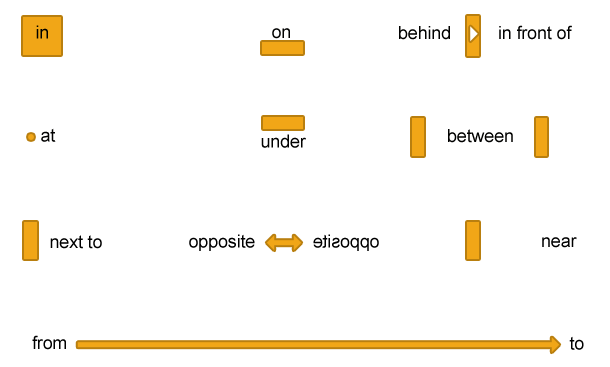| 1. |
I’m Fran
Yo soy Fran |
I’m not Peter
No Soy Peter |
You‘re Sara
Tu eres Sara |
You aren’t Lali
No eres Lali |
He’s clever
Él es listo |
He isn’t silly
No es tonto |
She’s slim
Ella está delgada |
She isn’t fat
No está gorda |
It’s a pen
Es un boli |
It isn’t a pencil
No es un lápiz |
We’re Spanish
Nosotros somos españoles |
We aren’t French
No somos franceses |
You’re English
Vosotros sois ingleses |
You aren’t German
No sois alemanes |
They’re Italian
Ellos son italianos |
They aren’t Greek
No son griegos |
|
| 2. |
What’s this? It's a blue pen. It’s mine.
¿Qué es esto? Es un boli azul. Es mío.
What’s that ? It’s a yellow cap. It’s yours.
¿Qué es eso? Es una gorra amarilla. Es tuya.
What are these ? They’re red pens.
¿Qué son estos? Son bolis rojos.
What are those? They’re yellow birds.
¿Qué son esos / aquellos? Son pájaros amarillos.
|
| 3. |
What’s your name? My name is John.
¿Cuál es tu nombre? Mi nombre es John.
What's your friend’s name? His name is Dani.
¿Cómo se llama tu amigo? Su nombre es Dani.
Which's your mother? She‘s the tall one. Her name is María.
¿Cuál es tu madre? Ella es la alta. Su nombre es María.
Who is your father ? He’s David. His name is David.
¿Quién es tu padre? Él es David. Su nombre es David.
|
| 4. |
How old are you? I'm 7
¿Cuántos años tienes? Tengo 7.
How old is your father? He’s 39.
¿Cuántos años tiene tu padre? Tiene 39.
|
| 5. |
Where are you from? I'm from Ibiza.
¿De dónde eres? Soy de Ibiza.
Where is your mother from? She's from Ibiza too.
¿De dónde es tu madre? Ella es de Ibiza también.
|
| 6. |
Adjectives: big/small , tall/short, beautiful/ugly, strong/weak, fat/slim...
Adjetivos: grande/pequeño, alto/bajo, bonito/feo, fuerte/débil, gordo/delgado.
|
| 7. |
Numbers: one, two, three, four..., twenty, twenty two, thirty three, forty…
Números: uno, dos, tres, cuatro…., veinte, veintidós, treinta y tres, cuarenta …
|
| 8. |
Body: head, eyes , ears, hair, nose, mouth, teeth, back, arms, hands, legs, feet...
El cuerpo: cabeza, ojos, orejas, pelo, nariz, boca, dientes, espalda, brazos, manos, piernas,...
|
| 9. |
Where's your house? It's next to the market.
¿Dónde está tu casa? Está al lado del mercado.
Where are the schools ? They´re near the church.
¿Dónde están las escuelas? Están cerca de la iglesia.

dentro, sobre, detrás / delante, junto a, cerca, en, debajo, entre, en frente de, de / desde, a.
|
| 10. |
There is a table in the room.
Hay una mesa en la habitación.
Is there a TV in your bedroom? No, there isn´t.
¿Hay una tele en tu habitación? No, no hay.
There are four boys in class.
Hay cuatro chicos en clase.
How many girls are there in your class?
¿Cuántas chicas hay en tu clase?
|
| 11. |
What time is it? 4.30 - It's half past four.
¿Qué hora es? 4.30 - Son las cuatro y media.
|
| 12. |
Would you like to colour this ball? Yes please.
¿Te gustaría colorear esta pelota? Sí por favor.
|
| 13. |
Can you play the guitar? No, I can't play the guitar, I can play the piano.
¿Sabes tocar la guitarra? No, no sé tocar la guitarra, pero sé tocar el piano.
|
| 14. |
Have you got a green bike? No, I haven’t. I’ve got a black bike.
¿Tienes una bici verde? No, no tengo. Tengo una bici negra.
Has she got an Italian boyfriend? No, she hasn´t. She’s got a French boyfriend.
¿Tiene ella un novio italiano? No, no tiene. Tiene un novio francés.
|
| 15. |
Do you like eating meat ? No, I don't like meat, I like fish.
¿Te gusta comer carne? No, no me gusta la carne, me gusta el pescado.
Do you live in England ? No, I don’t live in England, I live in Germany.
¿Vives en Inglaterra? No, no vivo en Inglaterra, vivo en Alemania.
Does he play handball ? No, he doesn't play handball, he plays tennis.
¿Él juega a balonmano? No, no juega a balonmano, él juega al tenis.
|
| 16. |
What are you doing? I'm writing.
¿Qué estás haciendo? Estoy escribiendo.
What's your father doing? He's working.
¿Qué está haciendo tu padre? Está trabajando.
What are your friends doing? They are playing on the beach.
¿Qué están haciendo tus amigos? Están jugando en la playa.
|